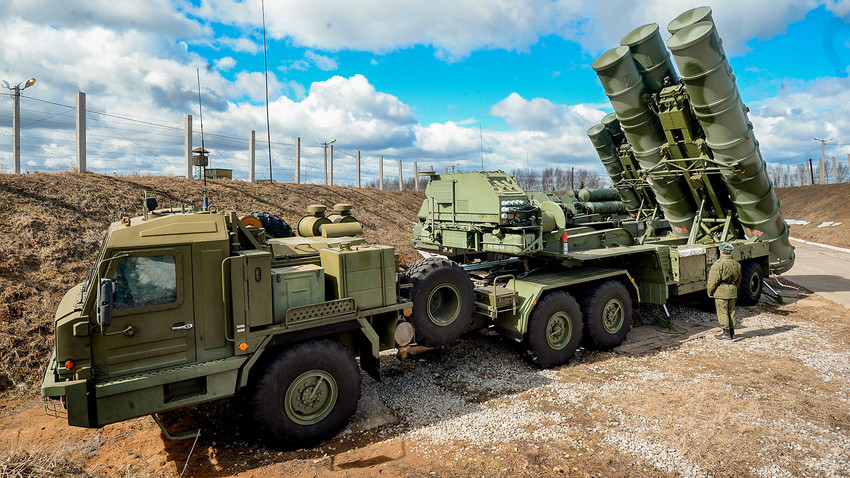Washington has suggested that NATO countries with Russian-made air defense systems hand them over to kyiv. Four allies are thus concerned: Greece, Slovakia, Bulgaria, with the S-300 and Turkey, which recently acquired S-400 “Triumph”.
On March 16, US President Joe Biden announced that the United States would release additional aid of $800 million for the benefit of Ukrainian forces, in particular to strengthen their air defense capabilities, with at least 800 anti-aircraft systems. portable airborne [MANPADS] Stinger.
S-400 air defense systems
For the moment, the Slovak Minister of Defense, Jaroslav Nad, let it be known on March 16 that Bratislava could give a favorable response to the American request, but on condition of obtaining replacement systems. Bulgaria has ruled out giving up its S-300s to Ukraine, its president Rumen Radev, having estimated that such a delivery would be tantamount to dragging his country into war.
As for Greece, there is also no question for it of separating from the two S-300 systems recovered from Cyprus in the 2000s, in order to put an end to a diplomatic crisis with Turkey.
The gift of S-300 to Ukraine makes sense insofar as the Ukrainian forces are familiar with this system to use it… Which is not the case with the S-400 “Triumph” batteries acquired by Ankara from Moscow.
However, American officials have suggested that the Turkish authorities transfer the S-400s in question to kyiv, according to several sources contacted by Reuters. The subject would have recently been broached by Wendy Sherman, the number two in American diplomacy, during a recent trip to Ankara.
As a reminder, the acquisition of S-400 systems resulted in Turkey being excluded from the F-35A combat aircraft program, under which it had ordered 100 copies. In addition, its arms industry has been sanctioned by the Trump administration under the US CAATSA law. Since then, Ankara has been seeking to procure F-16 “Vipers”, which is also proving complicated, given its bad press in the United States Congress.
However, Washington’s suggestion has obviously remained a dead letter for the moment. And there is a good chance that it will remain so thereafter. Indeed, if it is close to Ukraine [to the point of having established significant cooperation in the field of armaments], Turkey also needs Russia, if only for its supplies of cereals and in energy. Also, by separating from its S-400s, Ankara would risk alienating Moscow.
Turkey has so far expressed support for Ukraine, calling the Russian offensive “unacceptable”, while saying it opposes sanctions targeting Russia. In addition, she offered her mediation to the two belligerents.
Since the first day of the invasion of Ukraine [February 24, ed], the United States has granted kyiv aid totaling 1 billion [including the 800 million dollars announced by Mr. Biden last week]. However, the S-400 systems acquired from Russia cost Turkey 2.5 billion dollars… That is 2.5 times more than the American aid. Which makes one more argument for not giving them away without compensation…
Moreover, the Ukrainian military should be trained to use these S-400s, which can be doubted that they will be effective against Russian missiles and planes since they have no secrets for Russia.
Turkish leader Recep Tayyip Erdogan sees the war as an opportunity – “a boon”, writes political scientist Pinar Tremblay. The opportunity to win the presidential elections next June. Despite all the legal tricks he has already used to bend democracy to his advantage, Erdogan is now more shaky than ever. Indeed, six opposition parties, including the largest, have joined forces, his popularity is at an all-time low and his AK party is between 25 and 35% in the polls, while in 2018 he still won 43% of the vote. Finally, the Turkish economy is in dire straits, with inflation reaching 54% in February, its highest level in 20 years. This economic situation is aggravated by the current war. If only because Turkish tourism is heavily dependent on visitors from Russia. Erdogan can capitalize on the fear of even greater conflict, which is also prevalent in Turkey. In times of crisis, voters tend to opt for the safer choice, for the familiar and for a strong leader as well. For Erdogan, the war will continue.




Comments are closed